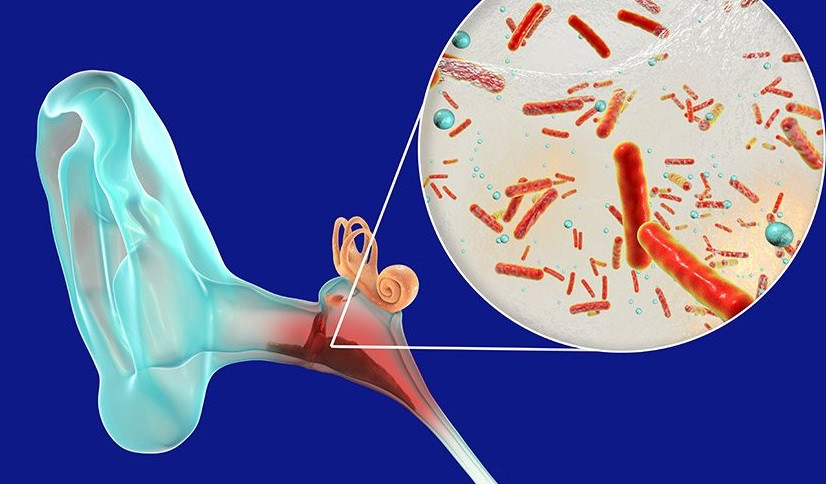Risk of ear, nose and throat diseases when swimming and effective prevention methods
Swimming is a favorite activity of many people, especially in the summer. However, swimming has the potential risk of many different diseases, how to prevent it?
The most common diseases when swimming are diseases of theENTbecause these are the gateways for bacteria and pathogens to enter the body.
1. Swimming can easily cause ear, nose and throat infections.
The nose and throat belong to the upper respiratory tract. In daily life, the nose and throat are the main gateway of the body, directly in contact with the outside environment. The nose and throat are closely related to the ears, connected to the ears through the Eustachian tube. Therefore, we are very susceptible to ear, nose and throat diseases, especially when swimming. The cause is drinking water or choking on water from swimming pools, rivers, streams, ponds, etc., bringing bacteria into the nose, throat, sinuses, etc.
Common ear, nose and throat problems when swimming, especially in young children, are pharyngitis, otitis media, rhinitis, and allergic rhinitis caused by swimming pool water disinfectants.
 |
2. Common ear, nose and throat diseases after swimming
- Sinusitis
After swimming, many people sneeze, have a runny nose, a stuffy nose, and a stuffy nose. The cause can be bacteria, viruses, fungi, or allergies to pool disinfectants. At that time, the patient sees that the nasal discharge is initially thin, then gradually cloudy, and then yellow or green. The person is tired, has a fever, and has a headache and face.
Chronic sinusitis occurs when acute inflammation recurs many times, affecting the patient's quality of life, especially children.
- Otitis externa
Otitis externa is a common problem in children, but adults can also easily get otitis externa when swimming. According to research, otitis externa occurs quite often after swimming. The cause is that the patient may be infected with bacteria or fungi in the ear canal, which then has symptoms such as earache, ear itching, tinnitus or ear heaviness. Sometimes the patient also has severe earache with fever.
- Sore throat
Sore throat in summer is also very common but when swimming, sore throat will also occur more often. The reason is that the hot weather of summer, the temperature is often high, if swimming for a long time, the body will get cold, leading to sore throat. When swimming, it can be due to choking on water or drinking contaminated lake, pond, river, swimming pool water, so it is also easy to get sore throat.
In case of acute pharyngitis, after swimming, you may feel tired, have a fever - high fever, sore throat, accompanied by symptoms of respiratory tract infection such as runny nose, cough with phlegm...
 |
Swimming can also cause otitis externa. |
- Otitis media
Acute otitis media is likely to occur when swimming, the reason is that if swimming in pools, rivers, streams with contaminated water will trigger an episode of acute otitis media. People with chronic otitis media will also have a recurrence due to swimming pool water penetrating through the perforated eardrum into the middle ear or through the nasal sinus through the Eustachian tube into the middle ear (common in young children).
Symptoms of acute otitis media include tinnitus, hearing loss, a feeling of water in the ear, a feeling of fullness in the ear, fever and/or severe pain in the ear.
3. When should I see an ENT doctor?
The ear, nose, and throat are interconnected structures, so when one organ is infected, it can easily lead to infection in another location. Furthermore, if left untreated, ear, nose, and throat diseases can affect the brain, meninges, nerves, and blood vessels.
If you have any of the following symptoms, you should go to a medical facility immediately for examination and treatment:
Sneezing, runny nose, stuffy nose or pain around the nose, itching, pain in the ear, nose or throat, high fever with sore throat, dizziness, tinnitus, hearing loss, ear discharge, nosebleeds, hoarseness or wheezing
Therefore, after swimming, if you experience the above unpleasant symptoms of the ear, nose and throat, you should see an ENT doctor for early diagnosis and timely treatment, especially for ear and sinus infections, especially in young children - because children's resistance is often weaker than that of adults.
4. Prevent ear, nose and throat diseases when swimming
- To participate in your favorite swimming sport in the summer while still protecting your health, you need to choose a swimming pool with clean water of guaranteed quality, and the water is changed regularly. You should not swim in pools with too many people.
- Do not go swimming if you have infectious diseases, respiratory infections, ear, nose, throat or eye infections, skin diseases, etc. to avoid making existing diseases worse and spreading them to others.
- Be conscious when swimming in the pool: do not spit, do not blow your nose, do not urinate in the pool.
- Limit pool water from entering your nose and throat. Do not choke on water. Wear goggles and a swimming cap.
- After getting out of the pool, blow your nose gently, tilt your head and hop around to let the water in the outer ear canal drain out. Do not dig your ears too hard as this can scratch the outer ear canal and make it easier for infection to occur. Take a shower with clean water and soap after getting out of the pool.
- Use eye drops, dry ears and gargle with salt water after swimming. Swimming time in the pool is limited (children under 5 years old can swim for less than 30 minutes, children over 5 years old can swim for less than 60 minutes). Rinse your mouth with clean water immediately after getting out of the water for fear of swallowing dirty water or water containing chemicals in the pool water that can damage tooth enamel./.


